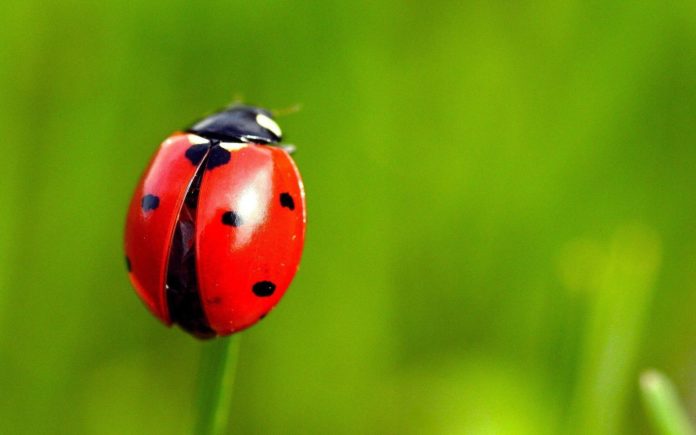The Ladybug, known as the ladybird, is often considered a symbol of good luck, and is one of the only insects that most people don’t squash or run from on first sight. Summer is coming and these beautiful little creatures can often be found sitting on our shoulders, waiting for an invitation to climb onto a welcoming finger.
The ladybug, is actually not an official “bug”, but rather is a type of beetle, a member of the coccinellidae family. Found worldwide, this curious little critter can eat up to five thousand harmful aphids a day, an all natural vacuum cleaner of unwanted nasties. While myths abound, the number of “spots” on a ladybug indicate the particular species, and a darker red hue is generally a sign of maturity.
There is a touching story in French folklore about a ladybug being the guest of honor at a condemned criminal’s execution. The story goes that a criminal had been ordered to his death by Kind Robert II of France. When the condemned placed his head on the executioner’s block, a ladybug landed on his neck. Considered good luck at this time in Europe, and even a divine symbol related to the Virgin Mary, the execution was paused to remove the small red bundle of innocence from the path of executioners ax. When the ladybug persisted and kept landing on the prisoner’s neck, King Robert II declared that this was divine intervention and that the execution had to be stopped. Several days later, the real criminal was caught and confessed, and the condemned prisoner who had been seconds from being headless was released.
Nearly every week these days I read about an innocent prisoner who has spent decades in jail and is now being released, either completely vindicated, or because there is too much doubt of the original evidence to justify further detainment. All too often these stories are rife with overzealous prosecutors, evidence that was tampered with or ignored, or DNA samples that uphold the defendant’s decades long cry of innocence.
In the past four decades, about one hundred and fifty people on death row have been exonerated. Studies have shown that roughly one in twenty-five death row prisoners may be innocent. 1 in 25. It is impossible for us to imagine the cruelty of a guilty verdict on an innocent mind, let alone a judgement that will end another human being’s life. It has long been shown that the death penalty does not serve as a deterrent, but rather as a way to give the victim’s and society as a whole the feeling of closure and justice. When even one innocent person is killed by a flawed justice system, every justification for the death penalty is erased. When dozen’s of innocent people are killed, our justice system becomes a source on injustice that murders innocents.
But what about clear cut cases of monstrous acts? I do understand, and in the past have even stood behind, this argument to support the death penalty. The problem with allowing the death penalty to continue, is that we have proven without any shred of a doubt that we as humans, and the justice system we have created, will never be perfect. Rather than focusing on the unconscionable acts that seemingly deserve ending the life of the a criminal, as a society we must consider the fact that we have killed, and will kill again, innocent people.
The story of Robert II of France and the Ladybird certainly lend to reflecting on the death penalty. But, the cute little round flying wonder also gives us other thoughts to consider as we breath in the fresh air of spring and soak in the warm rays of the sun. We often think of insects to be harmful, and it is true, many are. There are insects that destroy our crops and that bring us disease. This is the year of the Zilka virus, and the whole world is learning about this rapidly spreading illness carried by the Andean mosquito species. In the United States, we have long-feared the bite of the tiny tick that may be carrying the devastating Lime Disease. Despite these malicious little buggers, there are also dozens of beneficial insects including ladybugs, the green lacewing, and the praying mantis all of which are commonly used as a natural predators by farmers and gardeners.
Innocent people condemned as guilty, bugs that actually help us, what does this all mean? The writing is on the wall: we should not be quick to judge. In today’s world where everyone is labeled, we have more stereotypes than every before. Muslim, transgender, liberal, conservative… all badges worn with pride by some, and scorned by others. Here in Boston, and much of the United States, we are being faced with an epidemic of opiate abuse. Too often, I walk by 20-somethings who are recently homeless due to their addiction and I can be quick to judge. But, who am I to judge? It is impossible to find anyone who has not thrown stones from a glass house, and we are all works in progress. The endgame is not perfection, but rather putting in effort to be more understanding. No one is perfect, let’s think of the ladybug when we think about being quick to judge and let this little critter the French refer to as “the creature of the good God” remind us to be understanding, turn the other cheek, and reach out a helping hand rather than a vindictive one. Thank you Ladybug!
For more information about what you can do to help those who are wrongfully convicted please take a moment to visit The Innocence Project.




